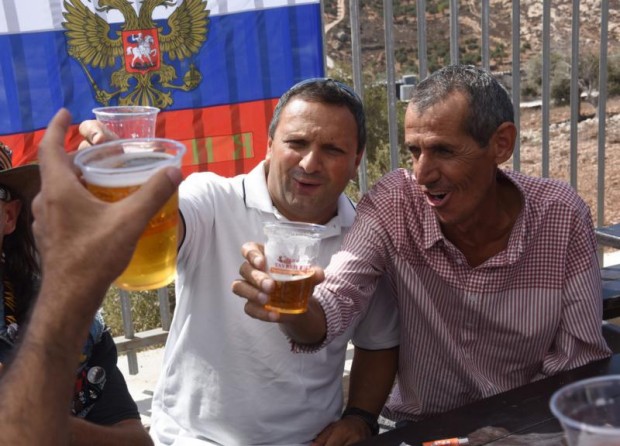TAYBEH, West Bank (CNS) — As Palestinians and Israelis in Jerusalem once again became embroiled in violence, locals and guests in Taybeh were enjoying ice-cold beers, grilled meats, frosted doughnuts and throbbing music as the all-Christian Palestinian village celebrated its 11th Oktoberfest.
“This gathering is good,” said a beaming Nadim Khoury, who together with his brother, David, opened the village’s now-famous Taybeh microbrewery, which hosts the festival. That was in 1995, two years after Nadim Khoury returned from an extended sojourn in the United States.
“It brings unity to all the people here; they share, sell local products, drink beer, eat,” Nadim Khoury said. “We show the world we can have a normal life, we celebrate life. The Middle East always has problems; this is our peaceful resistance.”
[hotblock]
Over the pulsating rap of a local Palestinian band, David Khoury, a former village mayor, remarked: “We brought democracy to Palestine by selling beer,” he said. “And someday we will toast peace over beer.”
Earlier, the family held a reception for the grand opening of their newest venture, the Taybeh Golden Hotel, located next door to the winery they opened last year. Religious leaders representing various Christians traditions were among the invited guests.
Nadim Khoury noted that while, in their advertising, they do not specifically mention the sale of alcohol, which is forbidden for Muslims by Islamic law, anyone who knows what an Oktoberfest is knows it’s all about the beer. Still, relations with their neighbors in the 17 surrounding Muslim villages are cordial lately, calmed down since a riot a decade ago when Muslim villagers attacked Christians in the village over rumors of an alleged romantic relationship between a Muslim woman and young Christian man from Taybeh.

A Palestinian man poses in cutout at the Taybeh Oktoberfest in the West Bank village of Taybeh Sept. 19. (CNS photo/Debbie Hill)
Today the villagers share in one another’s celebrations and ceremonies, and Taybeh brewery even sells a popular nonalcoholic beer to tap into the much larger local Muslim market.
Last year, following the war in Gaza, the Khoury brothers, who are Greek Orthodox, canceled the Oktoberfest for the first time in 10 years in deference to those who were killed and injured in the seven-week war.
This warm afternoon a traditional dance troupe of young girls performs on the stage set up inside the brewery compound, and a local athlete scheduled to go on to an international competition was praised and presented with a check. Farther away from the performances, children waited in line for clowns in colorful customs to paint their faces.
But for shawarma vendor Nael Akram Jaber, 37, the bottom line of the festival was the number of hungry customers who made their way to his stall after they got their beers on tap at the entrance. Over the Sept. 19-20 weekend, the festivities were expected to bring in 16,000 to 17,000 visitors, including foreigners, Palestinians and Arab Israelis.
“Everybody is buying drinks, Taybeh beer is world famous now. We have lots of guests coming, and we are their hosts. It is nice to see these people come stand with us, here in the biggest festival in Palestine. I hope they want a delicious sandwich,” Jaber said.
“It is a very happy weekend for us,” he added. “I hope we will make some money.”
Scurrying after his 3-year-old son and nephew who were up to mischief inside the brewery, Taybeh resident George Salem noted the importance of the normalcy the festival brought, not only to the village but for all Palestinians.
“We always want to have a normal life, for us, for our kids,” he said. “It’s a moment where we can get together, forget everything that is going on for a little bit. It’s a chance for people from all over to come and support Palestinians. It’s a peaceful festival. Instead of throwing stones we are drinking beer.”
PREVIOUS: Migration, freedom, ecology to be topics on pope trip, cardinal says
NEXT: U.S. diplomat tells pilgrims they can help normalize relations with Cuba




Share this story